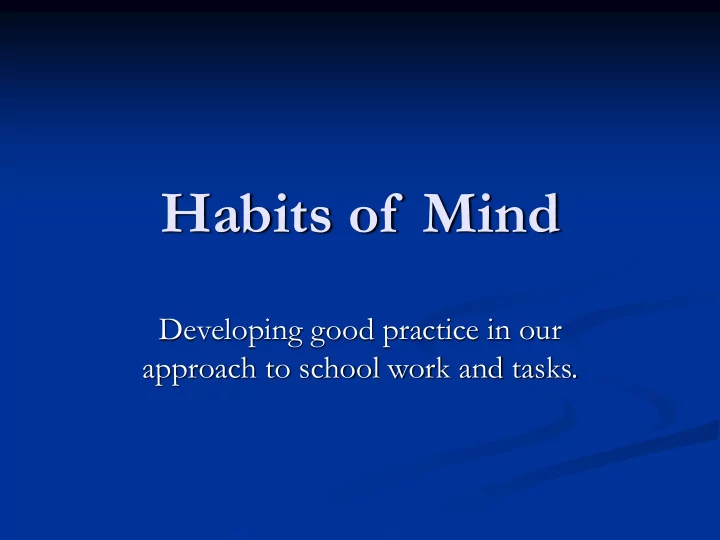

Habits of Mind Developing good practice in our approach to school work and tasks.
HABITS OF MIND " Excellence llence is an art won by train ining ing and habituatio tuation. n. We We do no not ac act rig ightly htly be because ause we have e virtue tue or excellen ellence, ce, but we rather her have those be because ause we we hav ave ac acted ed rig ightly. htly. We We are what t we repeated eatedly y do. . Excellence, llence, then, n, is no not an ac n act but a habit." t." Aristotle stotle
What is a habit? “ Something that is done frequently and almost without thinking, something hard to give up.” Oxford Dictionary.
Good and Bad Habits "Good habits are as addictive as bad habits, and a lot more rewarding." Harvey Mackay
What is a Habit of Mind? “A ‘Habit of Mind’ means having a disposition towards behaving intelligently when confronted with problems, the answers to which are not immediately known” Costa and Kallick.
PERSISTING Stick to it! Trying different strategies Finding different ways to reach your goals Remaining focused
MANAGING IMPULSIVITY Take your time! Thinking before acting (how many of us DON’T do that?) Choose your response ‘Think time’ and ‘wait time’ – e.g. count to three before call out
THINKING FLEXIBLY Look at it another way Looking at something one way and imagining it a different way Being open to alternatives, differences, change Coming at problems from a different angle Redefining what the problem is ‘As a result of hearing everyone’s opinions, I have changed my mind…’
LISTENING WITH EMPATHY & UNDERSTANDING Understand others Understanding where another person is coming from Another’s point of view and emotions LISTENING versus HEARING Are we always able to summarise the opinions of others?
STRIVING FOR ACCURACY Check it again Striving for your personal best Setting high standards Getting it right – doing it better Checking and finding ways to improve constantly Is ‘satisfactory’ good enough?
Thinking about your thinking METACOGNITION Know your knowing Being aware of your own thoughts, strategies, feelings & actions Reflecting – what works and what doesn’t work? Metacognitive awareness – how did you solve your problem? 176 + 232 = ?
QUESTIONING & POSING PROBLEMS How do you know? Having a questioning attitude Do you remember when you were five? Knowing what data you need Developing questioning strategies to develop that data
APPLYING PAST KNOWLEDGE TO NEW SITUATIONS Use what you learn! Access prior knowledge Take knowledge beyond the situation in which it was learned ‘Numb3rs’
THINKING & COMMUNICATING WITH CLARITY AND PRECISION Be clear! Fuzzy language – ‘EVERYBODY thinks that this is so…’ Really? Is there not ONE person who doesn’t think this way? Being accurate when talking and writing Avoiding over generalising, distorting, deleting, exaggerating
CREATING, IMAGINING, INNOVATING Try a different way Coming up with new ideas Being original
TAKING RESPONSIBLE RISKS Venture out! Reach for the stars Trying something new Going outside your comfort zone – growing as a person Measuring up the risks How many of us find talking in front of a group scary?
GATHERING DATA THROUGH ALL SENSES Use your natural pathways Tasting, smelling, touching, moving, listening, seeing Gathering different sorts of data Learning best by taking information in using all our senses
THINKING INTERDEPENDENTLY Work together! Working with others Learning from others Team work
FINDING HUMOUR Laugh a little! Seeing the funny side of things Laughing at ourselves Not about putting others down This habit is demonstrated by the most successful people Most advanced form of intelligence – it is a difficult thing to do
RESPONDING WITH WONDERMENT & AWE Have fun figuring it out Passionate, amazed, intrigued Love doing what you are doing The most successful love what they do – examples? Opposite of: ‘That’s boring…’ ‘Who cares…’
REMAINING OPEN TO CONTINUOUS LEARNING I have so much more to learn We do not know it all’ Door staying open The most successful people always want to learn more, to improve, to get better Opposite of being arrogant
ONE LAST POINT Nothing’s stopping you from becoming the most successful person you can be.
THE 16 HABITS OF MIND Thinking Responding & interacting • Thinking about your thinking • Listening with understanding and (metacognition) empathy • Thinking and communicating with • Taking responsible risks • Responding with wonderment and clarity & precision • Thinking interdependently awe • Thinking flexibly • Finding humour • Remaining open to continuous learning Data gathering Completing a task • Applying past knowledge to new • Persisting • Managing impulsivity situations • Questioning and problem posing • Striving for accuracy • Gather data through all senses • Creating, imagining & innovating
Recommend
More recommend